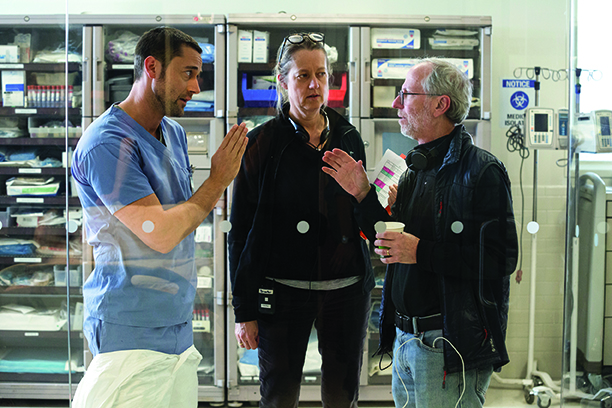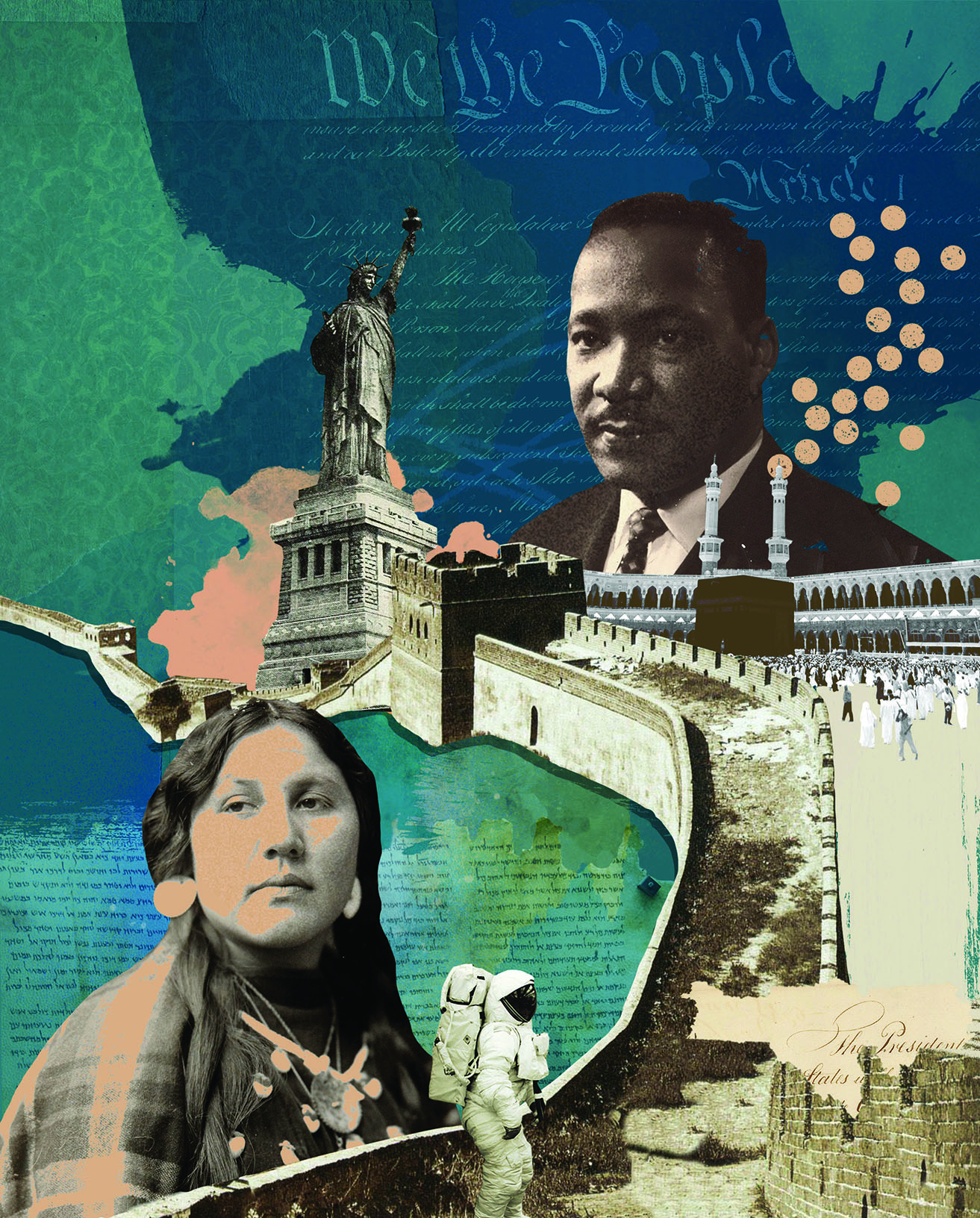Memoir by Eric Manheimer ’71 leads to small-screen success with NBC’s New Amsterdam

By Andrew J. Concatelli
Every patient in a hospital has a story to tell, and Eric Manheimer ’71 has spent his career as a doctor listening to and learning from those stories. Since he was a young resident, the internist—who spent more than 13 years as the medical director at New York City’s Bellevue Hospital and is now a clinical professor at the New York University School of Medicine—would spend as much time as possible with patients.
“I realized that what motivates me in medicine more than anything else are the patients. I sat with them, talked with them, and let them tell me their stories,” Manheimer says. “I started to write down some of their stories and how their lives intersected with medicine.”
Manheimer gathered those tales into the book Twelve Patients: Life and Death at Bellevue Hospital, which connected with readers and, surprisingly to Manheimer, with television producers. His memoir became the basis of the hit NBC television series New Amsterdam—named for a fictionalized version of Bellevue—which begins its second season this fall. Manheimer serves as a producer, writer, and someone who can offer medical expertise.
The show’s protagonist, Dr. Max Goodwin, played by Ryan Eggold, is based on Manheimer: an idealistic medical director at the nation’s oldest public hospital who faces a cancer diagnosis of his own. Goodwin, like Manheimer, makes it his mission to put patients before bureaucracy. While it’s Manheimer who says, “The only way to bring caring back to medicine is to let the patient tell their story,” that line easily could have come straight from the script to be delivered by Eggold’s character.
New Amsterdam has given Manheimer a whole new way to tell stories that combines his interests in medicine and important social issues.
Manheimer first turned his attention to writing and storytelling at Trinity College, where he majored in history. “Trinity sparked a real interest in me in writing,” the New York City native says. “I learned how to write by writing papers on history and receiving good comments and feedback from my professors. I got better and better at it, and I enjoyed writing. I even wrote things that weren’t assigned—just whatever I was interested in.”
The small class sizes allowed Manheimer to form close bonds with several professors who became mentors. “You could basically just walk into your professor’s office and sit down,” he says. “You could talk about a lot of different things—not just what was going on in the class but about exploring life’s issues and what was happening in the world.”
While he was on campus in the late ’60s and early ’70s, Manheimer took an interest in the political activity happening across the country, principally the protests of the Vietnam War. “I became an activist and remained that way my entire career,” he says. His draft number came up, but Manheimer got into medical school, which offered an automatic deferment. “It became a moot point, but it never became moot for me in terms of my philosophy and who and what I wanted to be.”
As the son of a physician, Manheimer had been exposed to the world of medicine from a young age, but it was learning about the societal, cultural, and historical influences on patients’ lives that helped him find his true passion. “My father was a professor at Albert Einstein College of Medicine and worked at Montefiore Hospital in the Bronx, where they took care of people in every social class,” Manheimer says. “My role models for my career became the people at the hospital who took an interest in the social dimensions of the people in their communities: family, addiction, immigration, language and cultural diversity, incarceration. Those became the issues that motivated my career.”
Prescription for today’s Trinity students
“Be skeptical of experts, but be respectful. Learn things for yourself, and learn from people you trust. Look at things from different angles, open your mind, and do that your whole career, not just as a student. Always verify, and learn other ways of viewing and solving a problem.”
Eric Manheimer, M.D., ’71
For example, a doctor may know the physiological causes of diabetes and how to treat it in the body, but Manheimer says he wanted to look at why a patient has diabetes. “Can they get the food they need? Why don’t they have health insurance? The core questions for me were the social environment and the social determinants of health.
“At a lecture on heart disease in those days, people would talk about risk factors—smoking, heart disease, family history, a lack of exercise. But it turns out those risk factors only account for about 40 percent of the risk of heart disease,” Manheimer says. “What I was interested in was, where is the other 60 percent? The biggest influences in health are income and a whole variety of social factors. That other 60 percent is really where I’ve spent my career.”
After medical school and his training, Manheimer worked abroad as an attending physician in Haiti and Pakistan. “That helped me to look at not just medicine, but life, through a completely different society,” he says. “The context of the patient’s life became the most interesting thing.”
Greg Ribakove, M.D., chief of cardiothoracic surgery at Maimonides Medical Center in Brooklyn, Manheimer’s friend and colleague, says that Manheimer brought his high ethical and moral standards to Bellevue, where he became the chief medical officer in 1997. “He has his priorities totally straight; patient care always come first,” Ribakove says. “He’s blind to race, religion, and socioeconomic class. He just takes care of the person in a compassionate way.”
Manheimer started carrying notebooks around at Bellevue, and the instinct to write just came to him, as it first did at Trinity. “I would write down everything I heard and saw. In the course of a day, I could add a few pages on interesting cases, complicated discussions, and national issues. Then 9/11 came along, and that became a whole notebook by itself,” he says. “Over the years, I ended up filling more than 150 notebooks with details of patients.”
During the process of writing Twelve Patients, based on selected patients whose cases spoke to different social issues, Manheimer was diagnosed with throat cancer and underwent treatment and a long recovery. “My editor suggested I write a chapter about my own health issues, and it was so cathartic. I had been a patient myself, and I felt that was important to show,” he says.

Several television networks showed interest in adapting the book. “I picked NBC because David Schulner, the showrunner, had a real understanding of the social issues,” Manheimer says.
“My life now is divided between writing, talking to the writers in L.A., and participating on the set in New York City,” Manheimer says. “It’s been wonderful. The team has accepted me and made me feel part of everything that’s going on. We’re really tackling lots of important social issues embedded in very good, dramatic relationships between people.”
Manheimer believes that New Amsterdam and other medical dramas that came before it have real value when it comes to educating audiences and exposing them to the experiences of others. “Hollywood has more influence over health knowledge in the population than anything else in our society,” he says. “What I wanted to do with this show is to use patients’ stories, inspired by my notebooks, to explore themes like immigration, mass incarceration, mental health issues, overprescribing medication, and a whole host of issues using the drama of a hospital. I think TV has an opportunity to educate through storytelling.”
Longtime friend and colleague Edward Fishkin, M.D., chief medical officer at Brooklyn’s Woodhull Medical Center, says that Manheimer’s career and the stories he has gathered show his dedication to giving people the health care that they need and deserve. “I think he learned a long time ago that one of the best ways to get that message across is through a story, whether it’s an academic story or political story or ethical story,” Fishkin says. “In New York City, there are incredible disparities in the health of communities. The fact that this is one of the wealthiest cities in history and that those sorts of disparities exist show that people like Eric and his ideas, his vision, and his mouthpiece are still very much needed.”
The second season of New Amsterdam began filming in June and will air on NBC this fall.
